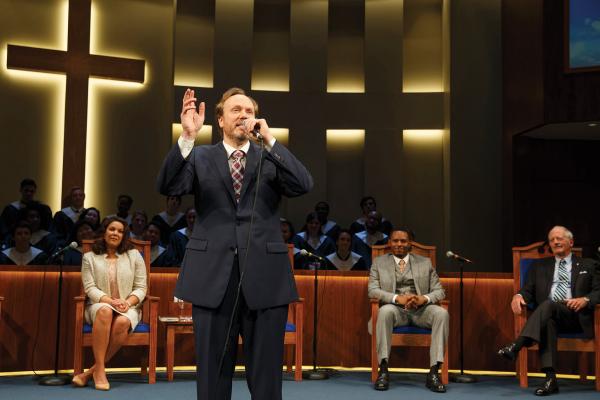“Make us one,
Make us one body,
Because when we are one body,
We see something we cannot see
By ourselves ...
In the name and in the blood of Jesus,
Amen”
SO OPENS LUCAS HNATH’S PLAY The Christians, which premiered at the Humana Festival of New American Plays in 2014 and at Playwrights Horizons Off-Broadway in 2015. The play is described as a “kind of sermon,” sometimes literal, sometimes figurative. The Christians marks a distinct turning point in the history of American theater, in that its evangelical main character’s struggle with ideas is treated as a serious subject that reflects on a nation’s moral dilemma.
Religious themes are hardly a new topic for U.S. theater, but most often they’ve been treated negatively. Arthur Miller’s plays, such as The Crucible and After the Fall, treat religion as an institution of animosity, even a kind of antagonist. Tennessee Williams uses religion as a quaint and antiquated emblem of Southern culture—such as in The Glass Menagerie, where the character Amanda says, with exaggerated sympathy, “You’re a Christian martyr.” Then there’s Inherit the Wind, by Jerome Lawrence and Robert E. Lee, a dramatic treatment of the Scopes Monkey Trial that depicts Christians as hostile and uneducated. If the American theater were an accurate mimesis of American truth, Christians would be lying, narcissistic, two-faced, McCarthyist bigots.
The Christians is a completely different story, in which the dramatic action depicts a loving, thoughtful pastor as the protagonist up against the institution of the church. Each character is treated with due reverence and given a fair argument, so that there are no easy answers, and the audience is left grappling with the central struggle. The play is reminiscent of Norwegian playwright Henrik Ibsen’s An Enemy of the People (a quote from this play is The Christians epigraph), where a citizen who tells the truth faces the wrath of a village that turns on him. Both plays explore deep ethical issues as the central characters risk their reputations and their livelihoods through standing by their principles.
The first scene of Hnath’s powerful drama is a contemporary church service, highlighted by PowerPoint slides, with a sermon based on Isaiah 30:12-13: “Because you have rejected this word and relied on oppression and depended on deceit, this sin will become for you like a high wall, cracked and bulging, whose collapse comes suddenly in an instant.”
The sermon is delivered by the energetic and youthful Pastor Paul at an evangelical megachurch that could be anywhere in the United States. He goes on to describe what he views as the crack in his church’s foundation, delivered with the smooth tones of a master orator who has always won the favor of the congregation. He tells a story he heard at a pastor’s conference about a boy, in a country ravaged by violence, who rushes into a burning building to save a little girl and dies from his burns. Pastor Paul is tortured by this story, told to him by a missionary who mourns for the boy saying, “What a shame, I didn’t save this boy for Christ ... what a shame I didn’t save this boy from hell.”
Read the Full Article

